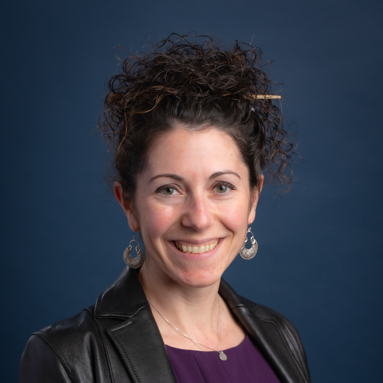WPI’s versatile master’s in Biology and Biotechnology will give you the rigorous knowledge, practical skills, and hands-on experience needed to launch a successful career in the life sciences or prepare for a medical or doctoral program.
As a student in our full-time, thesis-based master’s in biology and biotechnology program, you will join a tight-knit, dynamic community of researchers dedicated to advancing the understanding of living organisms and their molecular underpinnings. You will make your own discoveries as you explore areas of interest, and gain essential laboratory training, in our cutting-edge research facilities.
For a more robust program with additional research opportunities, consider WPI’s PhD degree program in Biology and Biotechnology.

When you pursue a master’s in biology and biotechnology, you’ll work closely with a faculty mentor to develop a targeted academic plan that matches your interests and career goals. Students typically divide their time among research, courses, and seminars. Core courses cover advanced topics in biology and biotechnology, as well as professional training in areas including grant writing, presentation skills, experimental design, and ethics within the life sciences.
You will culminate your degree program with a research-based thesis that applies the principles of biology and biotechnology using hypothesis-driven experimental methods to address a specific research problem.
As an MS candidate, you’ll have opportunities to conduct laboratory research in your course and thesis work, and you will be mentored by WPI faculty members who are making meaningful advances at the intersection of biology and technology in the following areas:
- cancer cell biology
- cognition and behavior
- cytoskeletal dynamics
- drug resistance
- epigenetics and gene regulation
- infectious diseases
- neuronal migration and degeneration
- regenerative medicine
- signal transduction mechanisms













MS candidates are encouraged to review the department's faculty pages to identify potential advisors.
You will have access to state-of-the-art equipment in WPI’s Life Sciences and Bioengineering Center, a research complex where an open-plan lab and presence of biotech companies encourage interdisciplinary collaborations. Facilities include an analytical instrumentation core equipped for NMR, Mass Spec, X-Ray Crystal, and qPCR analysis; imaging core with advanced microscopes for point-scanning confocal, spinning disk confocal, and TIRF microscopy; and an AAALAC-accredited vivarium.
Graduate Studies Series.
Team members from Graduate & Professional Studies host quick and convenient webinars designed to highlight popular topics when starting grad school. Take a deep dive into specific areas of interest such as how to secure funding, how to ace your application, an overview of student services, and more!
Faculty Profiles
Prof. Weathers is an internationally recognized expert on Artemisia annua and artemisinin, having worked with the plant and its phytochemicals including the antimalarial drug, artemisinin, for >25 years. She is a Fellow of AAAS and SIVB, won many awards, given many national and international presentations, reviews manuscripts for many journals and proposals for many national and international funding agencies. She is an Associate Editor for multiple journals. Her lab was the first to genetically transform A. annua.

Our lab investigates the molecular basis of phenotype switching in human fibroblasts that can be modulated using defined extracellular stimuli. We evaluate the role of oxygen and growth factor FGF2 isoforms independently and in combination in order to identify key molecular mechanisms and pathways, some of which closely mimic mechanisms described in human embryonic stem cells. Extended lifespan of these cells in culture also offers us a model for investigation of molecular mechanism that are regulating cell cycle in the context of both aging and cancer.


Work in my lab is focused on defining the cellular mechanisms that maintain genome stability in normal cells and understanding how these pathways are corrupted in cancer cells.

Research in my laboratory addresses questions in the field of evolutionary ecology and environmental biology, and typically combines field work and laboratory studies. Current projects focus on two disciplines.

A member of the WPI faculty since 2004 and chair of the Department of Biology and Biotechnology since 2022, Reeta Rao is a leader in the field of molecular genetics and genomics. Her primary research activities are focused on emerging infectious diseases, specifically understanding and managing fungal diseases. Students and research associates in her laboratory are trained to use a variety of biochemical, molecular-genetic, and genomic tools to study host-microbe interactions to explore fungal virulence strategies and identify novel therapeutics in a high through

I have a passion for understanding how living systems work, as well as for sharing my love of biology and research with the next generation of scientists and informed citizens.
The central goal of my lab is to understand the regulatory mechanisms that underlie mycobacterial stress tolerance. We combine genetics, genomics, transcriptomics and biochemistry to understand how mycobacteria respond to, and ultimately survive, stressful conditions.

It has been my lifelong dream to become a professor in the field of Biology. Being a faculty member provides a great opportunity to teach and interact with students. Students by nature are highly inquisitive and motivated, and as teachers, we have the responsibility to guide our students to explore and think in new ways. I believe that teaching is a two-way interaction between teachers and students. I come from India and my parents, both of whom were teachers, taught me to strive for excellence in my scholarly pursuits.
Prof. Weathers is an internationally recognized expert on Artemisia annua and artemisinin, having worked with the plant and its phytochemicals including the antimalarial drug, artemisinin, for >25 years. She is a Fellow of AAAS and SIVB, won many awards, given many national and international presentations, reviews manuscripts for many journals and proposals for many national and international funding agencies. She is an Associate Editor for multiple journals. Her lab was the first to genetically transform A. annua.

Our lab investigates the molecular basis of phenotype switching in human fibroblasts that can be modulated using defined extracellular stimuli. We evaluate the role of oxygen and growth factor FGF2 isoforms independently and in combination in order to identify key molecular mechanisms and pathways, some of which closely mimic mechanisms described in human embryonic stem cells. Extended lifespan of these cells in culture also offers us a model for investigation of molecular mechanism that are regulating cell cycle in the context of both aging and cancer.


Work in my lab is focused on defining the cellular mechanisms that maintain genome stability in normal cells and understanding how these pathways are corrupted in cancer cells.

Research in my laboratory addresses questions in the field of evolutionary ecology and environmental biology, and typically combines field work and laboratory studies. Current projects focus on two disciplines.

A member of the WPI faculty since 2004 and chair of the Department of Biology and Biotechnology since 2022, Reeta Rao is a leader in the field of molecular genetics and genomics. Her primary research activities are focused on emerging infectious diseases, specifically understanding and managing fungal diseases. Students and research associates in her laboratory are trained to use a variety of biochemical, molecular-genetic, and genomic tools to study host-microbe interactions to explore fungal virulence strategies and identify novel therapeutics in a high through

I have a passion for understanding how living systems work, as well as for sharing my love of biology and research with the next generation of scientists and informed citizens.
The central goal of my lab is to understand the regulatory mechanisms that underlie mycobacterial stress tolerance. We combine genetics, genomics, transcriptomics and biochemistry to understand how mycobacteria respond to, and ultimately survive, stressful conditions.

It has been my lifelong dream to become a professor in the field of Biology. Being a faculty member provides a great opportunity to teach and interact with students. Students by nature are highly inquisitive and motivated, and as teachers, we have the responsibility to guide our students to explore and think in new ways. I believe that teaching is a two-way interaction between teachers and students. I come from India and my parents, both of whom were teachers, taught me to strive for excellence in my scholarly pursuits.
Prof. Weathers is an internationally recognized expert on Artemisia annua and artemisinin, having worked with the plant and its phytochemicals including the antimalarial drug, artemisinin, for >25 years. She is a Fellow of AAAS and SIVB, won many awards, given many national and international presentations, reviews manuscripts for many journals and proposals for many national and international funding agencies. She is an Associate Editor for multiple journals. Her lab was the first to genetically transform A. annua.
Explore More Related Biology & Biotechnology Master’s Programs
Maybe you’re a working professional who wants to elevate your career in the biotech industry, but you need a more flexible option to gain that hands-on technical knowledge? With our online master’s in biotechnology and biology, you can join onsite lab sessions from the comfort of your home or on the go. Do you like learning about techniques and product development within the biotechnology field, but have a particular interest in solving biological problems? Our master’s in biochemistry dives into advanced coursework in modern chemistry from membrane biophysics to functional genomics so students can gain exposure to industry techniques and processes. If you’re interested in combining biotechnology, chemistry, and business, consider our online master’s in bioscience management which gives you the expertise to make strategic decisions in the biology field. Maybe you have a gift in statistics and computer science. Consider checking out our master’s in bioinformatics and computational biology which combines biology with computer science and mathematics to translate biological data into insights that improve the health industry.
Are You Looking for a Broad Approach?
If the biology and biotechnology field interests you, you might want to look into getting your bachelors’ first. WPI’s bachelor’s degree in biology and biotechnology provides a comprehensive education into the many overlapping and integrative areas of biology and biotechnology. If you’re fascinated by the potential within the field and how it applies to a different discipline, a minor in biology might be exactly the level of training you need. Or maybe you want to know more about how this focus can help populations around the world. The minor in global public health offers the perspective you need for your career while also satisfying your curiosity of how it all fits together.
Have questions?
WPI's dedicated graduate student support team can help.
Refer a Friend
Do you have a friend, colleague, or family member who might be interested in a WPI graduate program? Click below to tell them about our programs.

